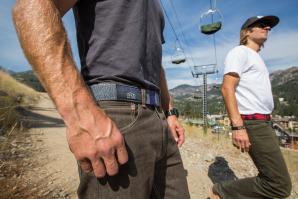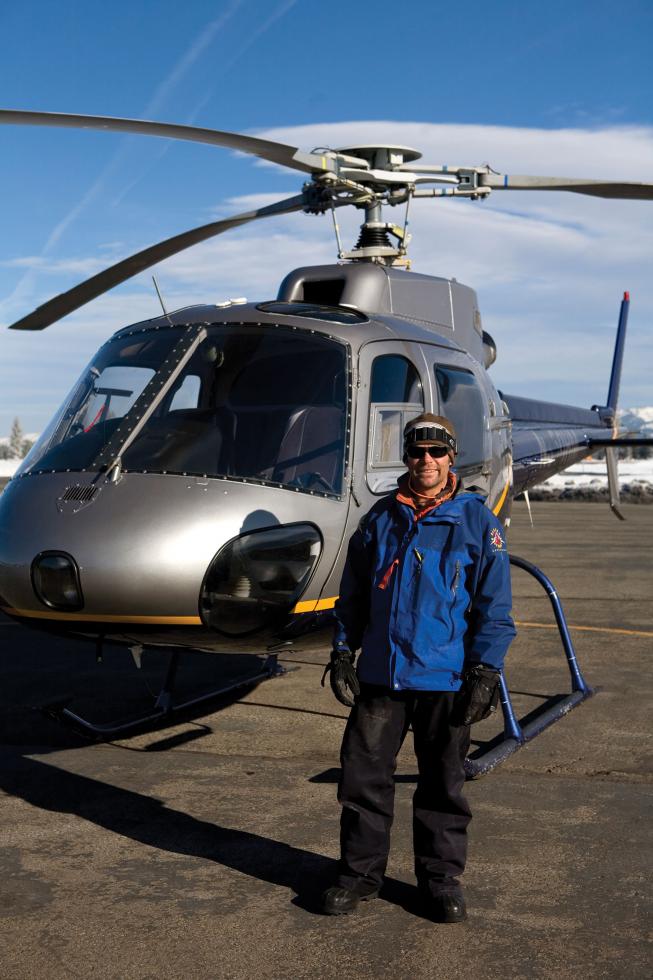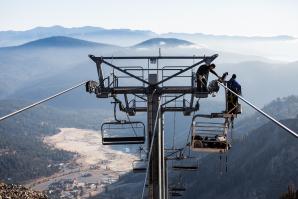Dave Rintala is giving new meaning to the term powder day. His Tahoe adventure-sport company, Pacific Crest Heli-Guides, in partnership with local chopper operator HeliTahoe, has sprouted a new helicopter skiing and snowboarding operation in the Sierra Nevada starting this winter.
The operation will be based out of the Truckee Airport and access more than 100,000 acres of privately owned backcountry land along the spine of the Pacific Crest between Squaw Valley and Sugar Bowl ski resorts.
Launching such an operation takes a “massive financial outlay, and I wasn’t even going to think of doing a startup with that kind of commitment,” Rintala says. “I couldn’t even fathom that.”
But a client “spy” with a friend in the chopper business approached him after a day of skiing with parent company, Pacific Crest Snowcats, to inform him that Claudio Bellotto, owner and chief pilot of HeliTahoe scenic tours, was looking for a partner.
“Until last year, HeliTahoe was a one-man operation. I had to make coffee, shave my legs and run the chopper myself. So Rintala and I are joining forces,” Bellotto says. “We are doing something no one has done successfully in this area, and it has enormous potential. It’s overdue, and Tahoe deserves it.”
Rintala says he’s committed to the necessary financial outlays. “It’s going to be an interesting learning curve over the next couple years,” he says.
But that is not to say Rintala is new to the heli-skiing and backcountry guiding game. He’s also not a stranger to building profitable adventure outfitters from nothing. In fact, true to ski-bum form, he wrote his first business plan while living in a van in the parking lot of Alpine Meadows.
Rintala has been operating Pacific Crest Snowcats just outside Truckee for nine years and has long been an owner/operator of Alaska Backcountry Adventures near Valdez, Alaska. Rintala has guided adventure enthusiasts doing just about every extreme sport there is: backcountry skiing, ice climbing, mountain biking, sea kayaking.
You name it; he’s done it.
After guiding clients at Alaska Backcountry Adventures for nearly two decades, a company official called Rintala one day with a dilemma and possible solution: The operation was $120,000 in debt, and if Rintala could pay off the debt, he could have the company.
So he pooled small investments and convertible promissory notes and acquired the floundering company in 2002.
“We did our best, but we ate it,” he says.
With a new $180,000 chopper contract on top of the original debt, Rintala was in the hole $350,000 by the end of his first season. He was debt free and profitable by 2008. Today, the Alaska operation grosses between $500,000 and $600,000 during its 60-day heli-ski season.
The story of his cat-ski operation reads similarly. In 2001 he launched the snowcat business from scratch on leased land with a 1963 snow groomer he bought for $16,000 and a tiny team of ski guides-cum-cat mechanics. Total startup costs: $25,000. The Tahoe operation now grosses about $170,000 a season, has about $200,000 in assets and no debt to date. It averages 1,200 clients in a four-month season and has been operating at full capacity for the past few years.
“Tahoe has been missing the heli-ski component,” Rintala says. “We get a lot of people almost daily asking whether we do heli-skiing, so I know there is a market there. I would be shocked if we weren’t profitable this year. To not profit would be unfathomable.”
Immediate investment returns at Pacific Crest would be made possible by the atypical contract Rintala was able to secure with Bellotto. Traditionally, heli-ski companies sign contracts for minimum daily use. The one Rintala holds in Valdez, for example, costs $180,000 for 50 days. If it’s blizzard conditions and the helicopter is unable to fly, too bad. But the contract with HeliTahoe is for on-demand use. Rintala can book the bird only when he needs it, saving him tens of thousands of dollars.
Meanwhile, talk of the operation among skiers and ski-industry media has been incessant. Rintala says announcing the launch of heli-skiing in Tahoe was like dropping a bomb.
“The hype has been larger than anything I have ever seen. We were flooded with emails and phone calls 12 hours a day,” Rintala says. “Snowboarder Magazine right away posted our news release on its website, and it when viral. We were getting calls from around the world before we had spent a penny on marketing and advertising. Within 24 hours of that news release we were running credit cards.”
But Rintala still has to contend with competition. Veteran heli-skiing operator Joe Royer runs Ruby Mountains Heli-Experience from a private ranch east of Elko, Nev., and his business model is decidedly more deluxe.
The all-inclusive, three-day trip from Ruby Mountains Heli-Experience starts at $4,250, so it’s drawing a different crowd than the one paying $900 for a single-day experience with Rintala, the lowest-cost heli-skiing experience in the contiguous United States.
“It’s a seamless package,” Royer says. “Guests arrive, they don’t need a car, meals are included with the exception of your bar bill. Our guides do everything.”
It’s not a cheap way to make a living. Ruby Mountains Heli-Experience runs 16 clients a day via two choppers with a staff of 32, including 10 guides, ground personnel, chefs, housekeepers, mechanics and pilots.
“It hasn’t been easy, but it’s been a terrific way to make a living,” Royer says. “If you can make 10 percent on your money, you’re doing good. You don’t get rich, but we’ve got a hell of a lifestyle.”
The problem lately for Royer is that business is down — about 10 percent. So there go the profits.
“Prior to three years ago, everybody was coming,” he says. “We had a waitlist 30 people long. Those days are over, and we’re out hustling like everyone else. People are not planning so far out. They’re not willing to spend that $4,000 and commit to it with a $1,000 nonrefundable deposit.”
Rintala hopes his lower price point, proximity to Central Valley clients and variety of guiding services (he now offers both cat- and heli-accessed hiking, mountain biking, fly-â?¨fishing and scenic tours) will allow him to capture the clientele Ruby Mountains Heli-Experience is missing.
“It’s a pioneering year,” he says. “The business has been fueled by passion. This isn’t about bottom line profits; it’s not something they teach you about in business school.”
Recommended For You

Arcade Winnings
An all-weather accessory company advances to the next round
A slope-loving trio needed durable, weatherproof belts that would fit comfortably, last a long time and look good. So the self-proclaimed ski bums decided to make their own. Olympic Valley-based Arcade Belts launched three years ago from a living room and specializes in belts made specifically for winter-sport enthusiasts.




